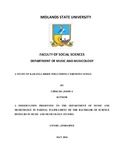Please use this identifier to cite or link to this item:
https://cris.library.msu.ac.zw//handle/11408/2247Full metadata record
| DC Field | Value | Language |
|---|---|---|
| dc.contributor.author | Chikura, Joshua | - |
| dc.date.accessioned | 2017-06-28T06:44:25Z | - |
| dc.date.available | 2017-06-28T06:44:25Z | - |
| dc.date.issued | 2016-05 | - |
| dc.identifier.uri | http://hdl.handle.net/11408/2247 | - |
| dc.description.abstract | The purpose of this research was to study some of the Karanga Bride Welcoming Ceremony Songs which are performed in Chimombe Village. This was mainly motivated by the need to find out the effects of the songs on the Shona traditional women in general and Karanga traditional women in particular. There was also need to establish reasons why songs are used to transmit traditional cultural conceptions. The research question that guided the research was: “What are the main themes contained in the bride welcoming ceremony songs? A small group of women was interviewed so as to solicit their views about the derogatory lyrics of some of the songs sung during the welcoming ceremony. Purposive Sampling was used to choose these participants on the grounds of their knowledge about what happens during the ceremony. The group had to be reasonably small so that the data could be manageable. The reason is also that the Qualitative research design I adopted is not concerned about numbers but rather feelings and perceptions of individuals. I also had to observe as an insider, a number of ceremonies and recorded the songs. This I did for triangulation purposes. All the interviews and observations were recorded on paper for subsequent analysis. The songs were then transcribed in staff notation as well as tonic sol-fa. I chose an Ethnographic research design because it win line with the nature of the, design an type of data I intended to collect.. During the data collecting exercise, I seriously considered ethical issues because I was working with human beings with ethical codes to uphold. The findings showed that the lyrics of most of the songs relegate the women to the position of servitude and subservience. The respondents also blamed socialization, culture and religion as superstructures which perpetuate this kind of social inequality among men and women. Finally, I strongly recommended that such practice should be abolished if ever our society dreams of achieving social equality, economic liberalization and gender equity. | en_US |
| dc.language.iso | en | en_US |
| dc.publisher | Midlands State University | en_US |
| dc.subject | Karanga bride welcoming ceremony songs. | en_US |
| dc.title | A study of Karanga bride welcoming ceremony songs. | en_US |
| item.languageiso639-1 | en | - |
| item.grantfulltext | open | - |
| item.fulltext | With Fulltext | - |
| Appears in Collections: | Bsc Music And Musicology Honours Degree | |
Files in This Item:
| File | Description | Size | Format | |
|---|---|---|---|---|
| Chikura.pdf | Full text | 1.48 MB | Adobe PDF |  View/Open |
Page view(s)
292
checked on Feb 14, 2026
Download(s)
200
checked on Feb 14, 2026
Google ScholarTM
Check
Items in MSUIR are protected by copyright, with all rights reserved, unless otherwise indicated.



